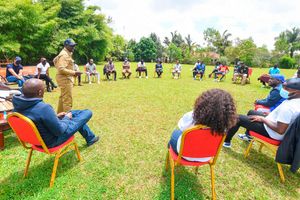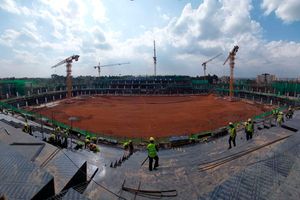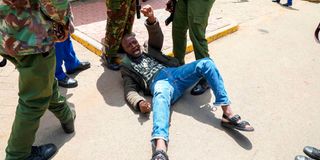
Police attempt to arrest an anti-femicide protestor in the streets of Nairobi on December 10, 2024.
As President William Ruto clocks 1,000 days in office, Kenya stands at a precipice.
Excessive use of force during protests, threats to freedom of expression, association and assembly, forced evictions, arbitrary arrests and detentions combined with enforced disappearances were but some of the violations that best describe his two and half years in office.
At least 352 Kenyans have been killed in extrajudicial murders since 2022- the year that President Ruto assumed office.
This according to the recent report by the Missing Voices Coalition- a consortium of several civil society organisations that provided data on enforced disappearances and killings in the country since 2022.
It is crucial to note that 2022, which accounts for 130 of these cases of deaths, was largely under the watch of former President Uhuru Kenyatta who exited power in August leaving the office to his erstwhile deputy, Dr Ruto.
In 2023, 118 Kenyans died in the hands of state-security agencies, with the number slightly decreasing to 104 in 2024. In matters of enforced disappearances, some 87 people have vanished, never to be seen again.
Majority of these persons, 55, went missing in 2024, especially during and after the Anti-Finance Bill 2024 protests. Ironically, these numbers reveal an unnerving reality.
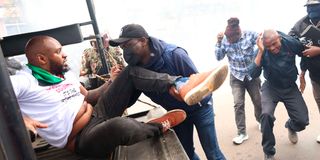
Police officers arrest activist Boniface Mwangi on Kenyatta Avenue in Nairobi on 25 July 2024 during anti-government protests.
What began with bold proclamations of constitutionalism and human rights reform by President Ruto has twisted into a shadowy chapter of state violence, abductions, and a government accused of ruling through fear.
The Kenya Kwanza administration, once seen as a break from Jubilee-era excesses, now faces fierce accusations of resurrecting the very tactics it decried: enforced disappearances, extrajudicial killings, and institutionalised impunity.
Beginning mid-2024, in the dead of night, unmarked vehicles have been screeching to a halt. Masked men jump out, the activists and critics of the Ruto-regime vanish.
The pattern is chillingly familiar.
Between June and December 2024, at least 82 Kenyans, most of them young, vocal, and online, were snatched from homes, streets, and even public transit, statistics from the Kenyan National Commission on Human Rights show.
Their crime, human rights organisations have deduced, is criticising the State.
Chilling accounts
Human Rights Watch and Amnesty International have documented chilling accounts. Accounts of blindfolded youth dumped in forests, tortured for days, interrogated about protest plans, and warned to "keep quiet or disappear for good."
Tens have never resurfaced. Parents have filed police reports, hired lawyers, and scoured morgues, often in vain.
During the visit of Finland’s President Alexander Stubb to Kenya in early May, President Ruto, who has been on record severally denying the states’ involvement in abductions and killings, announced that all Kenyans who were abducted, “have been released and returned to their homes”.
How he knew these victims were returned home yet was never in the know about their disappearances in the first place is a question yet to be answered by the country’s Commander-in-Chief.
During a town hall meeting last December in Kisumu, the Head of State was confronted on the issue of enforced disappearances but shrugged it off, asking the public to "Name them," claiming ignorance.
The Kenya Human Rights Commission fired back, branding his denial a "blatant lie."
In June 2024, youth-led protests against the punitive Finance Bill erupted like wildfire across Kenya.
What began as civic defiance morphed into state-sanctioned carnage, with police accused of firing live rounds into crowds. Teargas clouds choked children in classrooms.
According to the Independent Policing Oversight Authority (Ipoa), at least 67 people died. Cases of security officers shooting at retreating protestors and breaking into homes under the cover of night were documented by Amnesty International and Human Rights Watch.
Officers' identities
In late April 2025, days after the BBC aired an investigation revealing the identities of State security officers who shot and killed protestors at Parliament on June 25, 2024, Ipoa said it had completed 22 investigations, was actively pursuing 36 others, and has two officers currently before the courts.
"Of the completed investigations, eight are under final internal review, four are in the final stages of report writing before submission to the Office of the Director of Public Prosecutions (ODPP) for independent review, two were closed internally, four have been forwarded to the ODPP for review, and three were closed following ODPP directives," the Authority stated.
Among the victims during the Gen-Z protests was 21-year-old Denzel Omondi, a Jomo Kenyatta University of Agriculture and Technology student who never returned from a demonstration. His battered body was later found in a swamp.
An investigation was ongoing, authorities claimed during an update on the case, but like dozens of others, no one has been held accountable.
While addressing the nation at the height of the anti-finance Bill 2024 protests, Deputy President Kithure Kindiki, then the Interior Cabinet Secretary, praised the police’s “professionalism” during the protests.
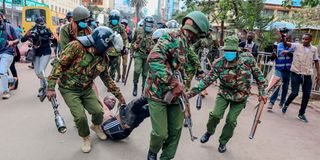
Police officers arrest a protester along Moi Avenue in Nairobi during anti-Finance Bill protests on June 27, 2024.
For victims' families, it was a slap in the face, just like how President Ruto, during a nationally televised interview, said that Kennedy Onyango, a 12-year-old who was shot and killed in Rongai by police officers during the protests last June, by asking “is still alive, right?”
Ms Jacinter Anyango, the late Kennedy’s mother, had painful words to describe the President’s claim regarding her son’s case.
“Hapo walinikosea sana. (They (government) really wronged me on that one. I kept asking God, why me, why my child? Had it been a rich person’s child, perhaps he would have found justice. I am now left with my God,” she told Nation during an interview on May 20, 2025- almost a year after the tragic death.
At the same time, some critical reforms to ensure respect for human rights, have stalled.
The National Coroners Service Act, which would create an independent office to probe suspicious deaths, remains unimplemented. The promised special tribunal to investigate historic injustices-dead on arrival.
Meanwhile, families of the disappeared cry for answers. The Convention on Enforced Disappearances, which Kenya pledged to ratify- forgotten. The State’s silence is deafening.
Kenya’s allies are beginning to take note. In late 2024, European envoys issued a rare joint statement urging the government to rein in security forces and investigate protester deaths. UN special rapporteurs have demanded answers on the disappearances.
Civil society leaders are reporting increasing surveillance, intimidation, and the revival of “dirty tricks” units within police agencies.
While the regime’s proclaimed economic reforms and international borrowing dominate headlines in Ruto’s state visits to other countries, back home, fear tightens its grip. Critics are painted as traitors even as Kenya's democratic credentials, once admired across the continent, are fraying fast.
To his supporters, Ruto is a man under siege, pushing painful reforms while battling entrenched interests. But to his critics, he is becoming a twenty-first century strongman cloaked in democratic legitimacy.
“We must not allow the powers that be to take us back to the dark days when our democracy was taken for granted and dictatorship was the order of the day. I urge you young Kenyans to stand firm and not shaken to reclaim our country,” Prof Patrick Lumumba said during a Citizen’s Assembly forum organised by the International Commission of Jurists-Kenya.
As Ruto’s presidency crosses the 1,000-day mark, Kenyans are left to grapple with a hard truth: the promises of a constitutional order are being buried beneath a growing pile of bodies. Their leader, they worry, might have traded justice for power.
They long for the keeping of promises given by the President, the promise to disband rogue units, prosecute abusers, and restore institutional independence.

